In this article:
The first thing that comes to mind upon hearing about oregano is how it makes pizza and pasta sauces delicious. Although it is used in several recipes, this herb is not explored enough for its health benefits.
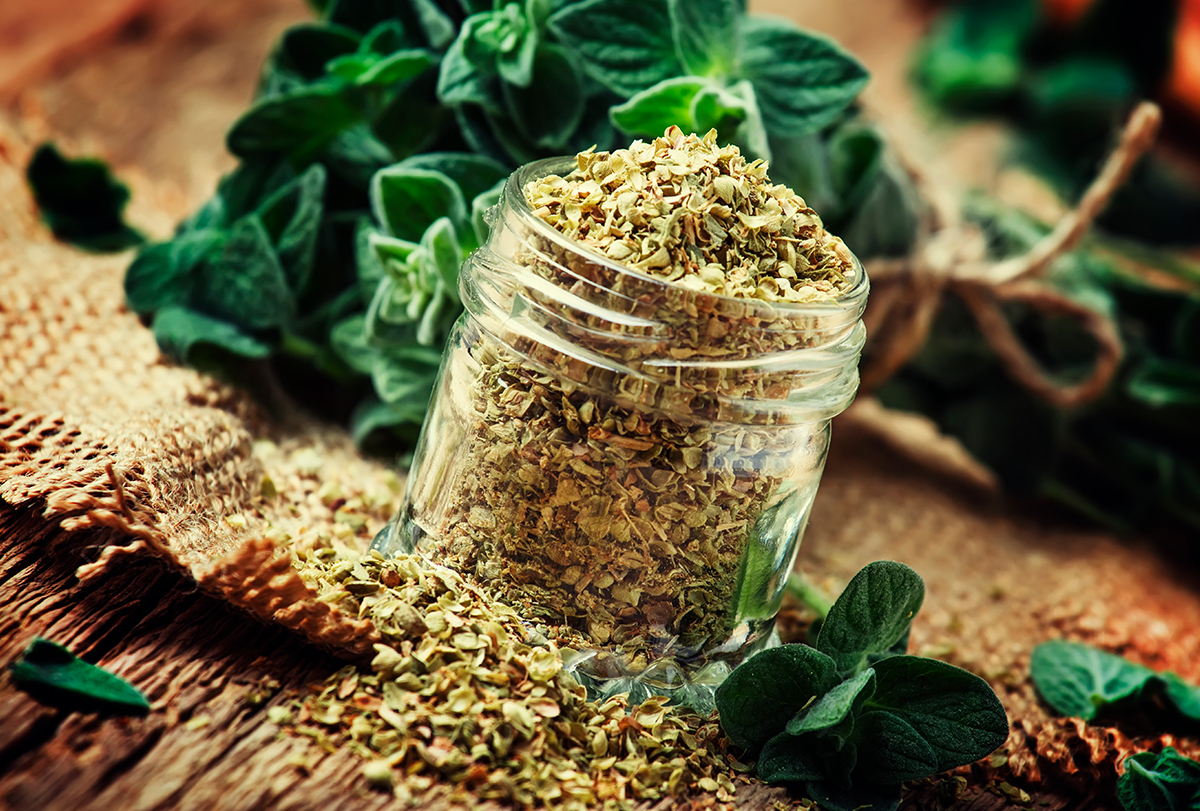
Oregano is an herb belonging to the Lamiaceae family. It can be used fresh or dried, and its essential oil is considered to have the same beneficial effects as the herb itself. (1)
Nutritional Profile of Oregano
While oregano is not used in large quantities, its nutritional benefits cannot be ignored.
Just 1 teaspoon of dried oregano leaves can contribute to 3% of your daily fiber requirement. It is also a good source of vitamin K, contributing to 9% of your total daily requirement. Also rich in minerals, it provides 4% of your daily requirement for iron and manganese. (2)
Oregano is rich in the compounds carvacrol, thymol, and rosmarinic acid, which are antioxidants, antifungals, and antibiotics. (1)
Top Health Benefits of Oregano
This article will present the many benefits this little herb has to offer.
1. Inhibits bacterial growth
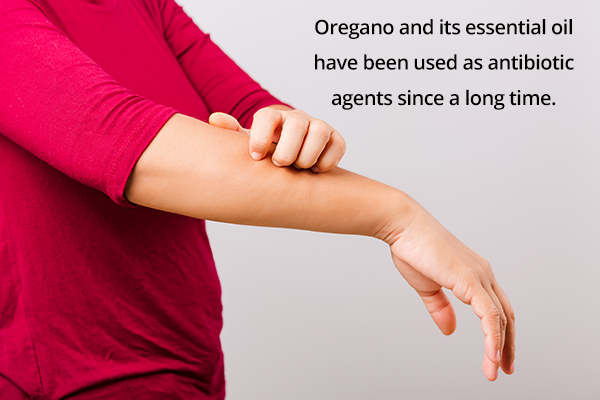
Oregano and its essential oil have been used as an antibiotic for a long time. Several studies have shown their potential as antibacterial agents against several strains of bacteria. (3)
This property of oregano has been attributed to its main bioactive active compound carvacrol. In a study, oregano oil was effective in killing all the bacterial strains it was tested against in infections caused by burns in mice. (4)
The use of oregano oil as a therapeutic agent is still being studied, and it is advisable not to use it without consulting a doctor.
2. May lower cholesterol levels
Carvacrol also has been identified to have potential cholesterol-lowering effects.
Animal studies have shown that mice fed with carvacrol supplements had lower fat levels even when they were eating high-fat food. (5)
3. May curb yeast infections
Though generally harmless, yeast can become infectious when it overgrows.
Some studies have shown oregano essential oil to be effective in treating yeast infections. It controlled the formation of candida and prevented it from sticking onto the surface of the skin. (6)
4. Improves respiratory conditions
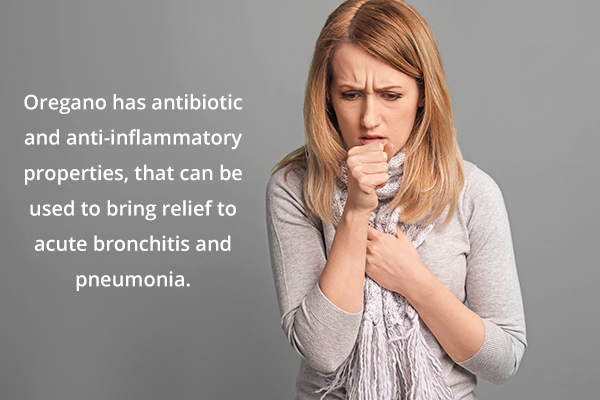
Oregano’s most famous use is for treating infections of the upper respiratory tract. Due to its antibiotic and anti-inflammatory properties, oregano can be used to bring relief to acute bronchitis and pneumonia.
Studies done on adults with upper respiratory tract infections and treated with oregano extract showed a reduction in symptoms including sore throat, cough, or hoarseness within just 20 minutes. (7)
5. Improves gut health
The antimicrobial activity of oregano is useful not only as an antibiotic but also as an antiparasitic. (8)
In addition, it can strengthen the muscle wall of the intestines, preventing a condition known as a leaky gut, which is characterized by the weakening of the muscle wall of the intestine, causing bacteria to leach out into the blood. (9)
In a study done on pigs, oregano essential oil reduced the production of inflammatory substances while also improving the strength of the intestinal walls. (10)
6. Aids in weight loss
Oregano can also aid in weight loss due to its carvacrol content.
Animal studies done on mice fed with a high-fat diet along with carvacrol supplement showed significantly less weight gain and fat levels. (11) It also reversed the body’s signaling to decrease inflammation and reduce fat cells. (11)
Though clinical trials and human studies are lacking, oregano shows good potential in reducing obesity.
7. Fights inflammation
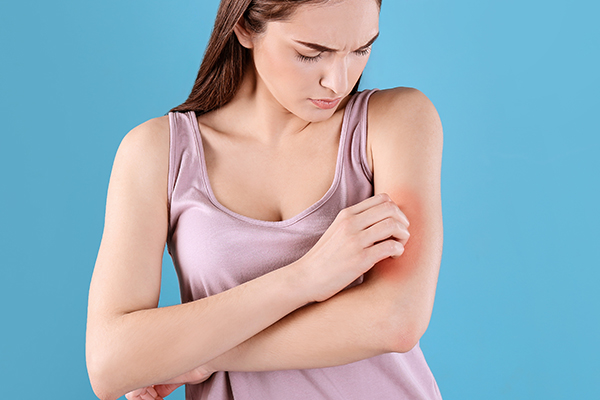
The active compounds of oregano act as strong anti-inflammatory agents.
Inflammation within the body can cause serious chronic illnesses such as diabetes, heart diseases and stroke, allergies, and even cancer. (12)
Test-tube studies have shown treatment with oregano oil reduced all the markers of inflammation. (13)
8. Provides antioxidant effects
Oregano also acts as a strong antioxidant within the body, useful in reducing the symptoms of many chronic illnesses.
Lab studies done on extracts of various species of oregano all showed that they all provided strong antioxidant activity. (14)
9. May bring relief from pain

Oregano has been used to bring relief from stomach aches, pains, pain from fractures, and toothaches. (15)
Animal studies have found that oregano extracts reduced pain in rats. The pain reduction was greater at larger doses of oregano. (16)
10. May help fight cancer
Several reports have evaluated the efficacy of oregano oil in its potential role in cancer.
Due to its anti-inflammatory and antioxidant capacity, oregano extracts are potentially toxic to cancer cells. (13) Several studies have been conducted on the effect of oregano on cancer cells, where oregano showed antitumor activity. (15)
How to Consume Oregano
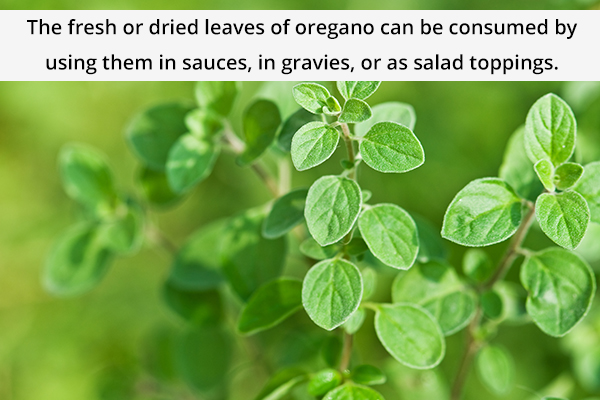
The fresh or dried leaves of oregano can be consumed by using them in sauces, in gravies, or as salad toppings.
For topical application, oregano essential oil is to be mixed with a carrier oil (such as coconut oil, almond oil, or jojoba oil) in a 1:5 ratio. A patch test is recommended before application to wounds to determine intolerance and potential allergies. Simply apply the diluted oregano oil to a patch of healthy skin and wait for 24–48 hours.
If no rash or boils appear, it can be used as desired. Oregano oil supplements are also available, which can be consumed. Though ideal dosages have not been studied, package instruction can be followed.
It is also highly advisable to seek a doctor’s help in deciding to use oregano as an adjunct.
Precautions to Consider
As with any remedy, there are some precautions to consider when using oregano and its essential oil.
- Large amounts of oregano oil ingestion can be diuretic and cause loss of water from the body. (16)
- Though oregano oil is an antibiotic, it is not recommended to be a replacement medication in the case of severe infections.
- Do not use oregano oil directly on the skin or for consumption, as it may irritate the skin. Always use a diluted form.
Most-Asked Questions About Oregano
Can oregano be harmful?
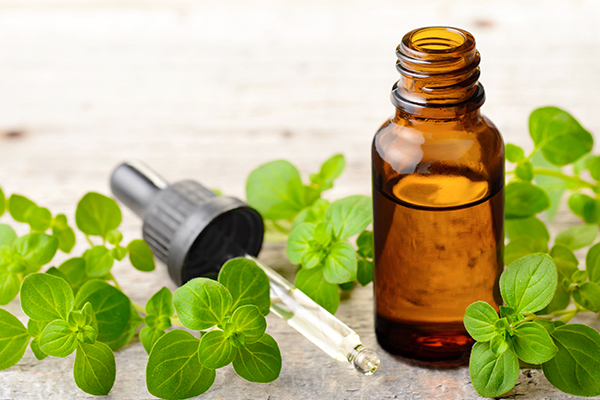
If consumed in small quantities, oregano will not cause any harm or toxicity. However, you must be careful with its overconsumption.
Are carom seeds the same as oregano?
Carom seeds, or ajwain, and oregano are commonly misunderstood to be the same plant due to their similarities in taste. However, they are different plants. Ajwain leaves are more grassy, whereas oregano has slightly broader leaves.
What can we use instead of oregano?
To flavor dishes, fresh or dried thyme, basil, or fenugreek leaves can be used. Mixed Italian seasonings are readily available and often contain oregano leaves as an ingredient.
Final Word
Though tiny, oregano offers several health benefits. It is used in many cultures and alternative medicine to treat infections, specifically of the upper respiratory tract.
It is also a potent antioxidant, antifungal, and antiparasitic. It reduces inflammatory substances and lowers fat and cholesterol levels in the body, in turn promoting heart health and preventing the progression of cardiovascular diseases.
Fresh or dried oregano is easy to use and can add a lot of flavor to dishes. Just be cautious in its use and do not overconsume it.
- Was this article helpful?
- YES, THANKS!NOT REALLY


